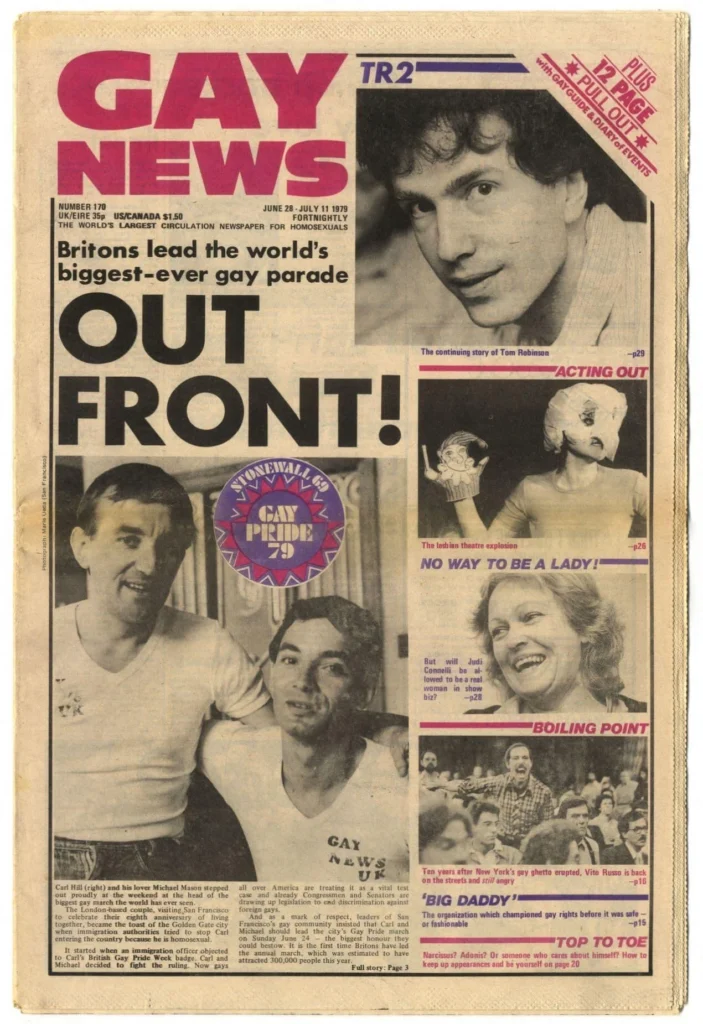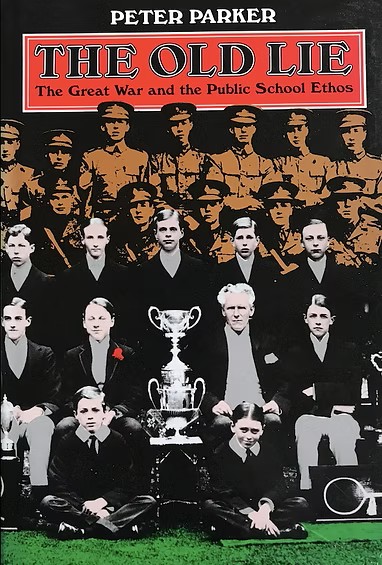Just a decade after the legalisation of male homosexuality in 1967 Peter Parker, then a young, aspiring, English Literature student at University College London decided to turn what others at the time would have seen as a disadvantage into a saleable advantage to build a career.
In his words, ‘I was intentionally looking to start a literary career in journalism and thought why not take advantage of being gay, I used to take Gay News into school, I waved it around and made a nuisance of myself!’
His journalism career began when he noticed that a book that had interested him had not been reviewed by Gay News (Andrew Birkin’s- JM Barrie and the Lost Boys). He then approached the literary editor of the paper and Cambridge University lecturer Alison Hennegan, who agreed to publish his review and from there he became a regular contributor and columnist.
In regard to the Gay News newspaper of that era he says, ‘we were always getting ourselves into trouble.’ This is reflected by the fact that in 1976 Mary Whitehouse was able to take the paper to court in the UK’s last successful blasphemy trial. Parker continued to work for Gay News until it’s closure in April 1983.

Gay News 1978 Credit:beatchapter.com
Parker continues, ‘my first published work after that was for the London magazine on E M Forster’s Selected Letters, you see a pattern emerging here. Most of my books have a pretty strong queer element one way or another, except for my book on Botanical Latin, which is the least queer book I have written.’
When Gays the Word was raided in April 1984. Parker was also asked to provide a defence for the Victorian homo-erotic novel Teleny, anonymous in terms of its author, but attributed to Oscar Wilde, Parker says,’ as a literary work it is difficult to defend, but as a work of great historical interest it is different.’
An alumnus of Canford School in Dorset along with Derek Jarman (artist, film maker and gay rights activist, creator of the punk film Jubilee in 1978) and Alan Hollinghurst (gay writer, author and Booker prize winner-The Line of Beauty in 2004). Referring to them he joked in our interview that, ‘there may have been something in water’.
In 1974 he attended University College London (UCL) as undergraduate in English Literature. Attending the Fresher’s fair, he found the Gay Societies bookstall and from there he became a volunteer for the London Gay Switchboard. It was at UCL where he met, as lecturers, Stephen Spender and then Peter Goulden, who were both themselves gay.
Parker continues. ‘It was whilst at University I had a wonderful tutor Dan Jacobson, a South African, for whom I had to write various essays. One compared the ideals of WW1 with the ideals one got in school stories. He felt that I may be onto something and that became my first book. (The Old Lie: The Great War and the Public School Ethos, 1987).

The Old Lie Credit: Peter Parker
Peter Parker, now 70, (Born Herefordshire on 4 June 1954) he has become a writer and journalist that people would go to for comment, analysis and to write on a given subject where homosexuality was a theme or thread through the story.
He is credited with writing the definitive biography of the Anglo-American writer Christpher Isherwood in 2004 (Isherwood). He has gone on to contribute articles to, amongst others, The Listener, The Independent, The Telegraph, the Sunday Times and the Oldie.
It is this that led Penguin books to approach him to ask could he write a book around the gay characters that lived in Soho and Fitzrovia. His research uncovered far more than just that small area of London and came up with some fascinating stories leading to the project expanding into the two-volume set, Some Men in London.
In Some Men in London Parker is forthright about his hope that some people will be offended by the language and tone used by some of the commentators.
He brings special attention to some of the comments made by the judiciary, members of both Houses of Parliament, the police, health professionals, with special mentions for psychiatrists and social workers of the time. Use of some of the wording today would lead to deplatforming and cancelation and not without reason.
This leads Parker on to comment on why he thinks the books are important. He feels young gay people today have rights, to marriage, adoption, and to not be discriminated against, yet know little or nothing as to how it all started.
The fact that the government of the day refused to even discuss the details of the Wolfenden Report when it first came out led to A. E. (Tony) Dyson and Andrew Halliday-Smith forming the Homosexual Law Reform Society in 1958.
Dyson and Halliday-Smith were said to be inspired by the suicide of a fellow undergraduate student because of being gay or something that happened because he was gay.
They campaigned by promoting pamphlets and engaging with the great and the good via letters in the Times and the Telegraph politely asking that people raise the issue with their MPs. They also managed to get many famous people to sign their petitions that were then forwarded to MPS and Parliament.
The fact that they were successful in winning the debate and partially successful in getting the law changed was a credit. The change, however, only applied to England and Wales and not at all for the Armed Forces. Scotland had to wait until 1981, Northern Ireland 1982. The ban on homosexuality in the British Military was not lifted until January 2000.
It is Parker’s contention that from this we then progress to the Campaign for Homosexual Equality (CHE) of the 1960’s, the Gay Liberation Front (GLF) and the politically motivated Gay Pride marches of the 1980’s that have now become a commercial Pride celebration.
From this may have come a complacency that means young gay people no longer feel the need to protest as they did in the past, but they still need to be aware of what can happen if they become too complacent.
Complacency is far from something one could lay at the feet of Peter Parker. From the schoolboy waving his Gay News in defiance. The early journalist making his way by turning what some saw as negative into a credible writing career. Now, with the 70-year-old taking his books on tour to tell the stories of the queer pioneers of post-World War London Peter Parker is a force of nature!

